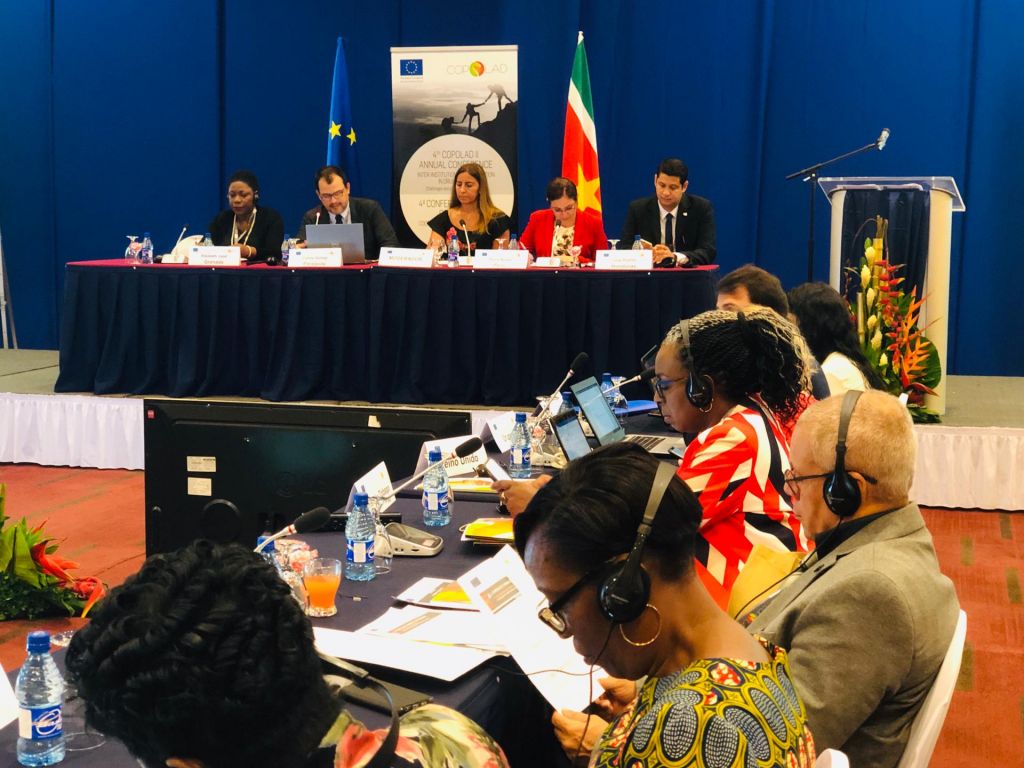Paramaribo, 18 June 2019. The International and Ibero-American Foundation for Administration and Public Policies (FIIAPP) together with the Government Delegation for the National Plan on Drugs (DGPNSD), organized in Paramaribo (Suriname) the 4th Annual Conference of COPOLAD II: “Inter-institutional Coordination in Drug Policies: Challenges and Promising Advances”.
COPOLAD promotes the adoption of effective, efficient and evidence-based responses to drug-related challenges in line with the 2030 development goals. For the fourth consecutive year, this conference aims to provide an appropriate space for dialogue so that the authorities responsible for drug policies in the European Union (EU) and the Community of Latin American and Caribbean States (CELAC) have the opportunity to exchange information and agree on cooperation actions between the countries of these two regions.
The inaugural session of the Conference is chaired by Mr. Glenn Uiterloo, Director of the National Anti-Drug Council of Suriname and Mr. Cristian Duta, Deputy Director of the National Anti-Drug Agency of Romania, co-chair on behalf of CELAC and the EU, respectively, as representatives of the countries that share the Presidency of the EU-CELAC Coordination and Cooperation Mechanism on Drugs. Accompanying the two countries are Ramón Espinosa, on behalf of the Directorate General for Development and International Cooperation (DG DEVCO) of the European Commission; Azucena Martí Palacios, Government Delegate for the National Plan on Drugs (DGPNSD), who represents Spain as the leading country in charge of implementing the COPOLAD Programme, and Teresa Salvador-Llivina, Director of COPOLAD.
What are we talking about when talking about institutional coordination in public policies on drugs?
During these two days, the COPOLAD Annual Conference will have the opportunity to explore what inter-institutional coordination means in practical terms. The reality suggests that, so far, the way in which these drug policy strategies have been carried out has been carried out separately from the different national instances, sometimes without prior communication or information, between Ministries, Directorates or Agencies, whether from a health, social or educational perspective, or from a legal, security or control perspective. This is the challenge that, once posed honestly between countries, is to address, putting on the table the effective tools to achieve real progress in this area.
During the first three years of implementation of the COPOLAD programme, special attention has been paid to this reality, and an attempt has been made to support countries in the coherent coordination between the various actors involved in the development of public policies on drugs. This support extends to all the areas involved and to all regional levels, as well as to the various governmental and non-governmental organizations. Facilitating communication mechanisms that try to avoid the traditional flow of information based solely on hierarchy, and ensuring that it is transmitted more horizontally and not just vertically, seems to be one of the objectives for effective coordination among the multiple actors involved in policy-making in such a crucial sector of public policy.
COPOLAD Annual Conference
The 4th Annual Conference of COPOLAD II intends this year to identify mechanisms and instruments that can contribute, successfully, to create a solid intersectoral participation in which multiple institutions and organizations of the sector establish the necessary cooperation for the implementation of effective drug policies, through the presentation of success stories on the benefits derived from good coordination.
The holding of the Annual Conferences of the COPOLAD programme is a unique annual occasion for those responsible for drug policy in the governments of the CELAC countries and the EU to jointly explore lines of action within a framework of bi-regional cooperation.
The 4th Annual Conference of COPOLAD II will be held in Paramaribo (Suriname) from 18 to 19 June 2019.






